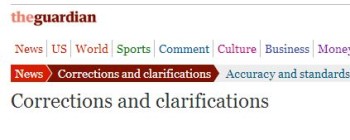
(Credit: Guardian, screenshot)
How do you get an apology from the UK Guardian?
The readers’ editor for the newspaper, Chris Elliott, recently explained how it decides when to include an apology in a correction. In his Nov. 10 column, Elliott responded to readers who questioned “why the Guardian doesn’t say sorry more often,” especially given the approximately 8 corrections the paper publishes a day.
“Last year, we published around 3,000 items in the corrections and clarifications column in print and online,” Elliott wrote. “However, some readers can’t understand why the word ‘sorry’ or ‘apology’ doesn’t feature more often in those reports.”
According to Elliott, the Guardian is careful to only include apologies to signal to readers what errors are significant. As examples for comparison, he noted that the Guardian apologized to the families of two girls killed in a car accident when it mixed up their names in a photo caption.
But, the newspaper didn’t apologize when it mixed up the names of people shown in a caption for a photo of a business event. (The Guardian did publish a correction; it just didn’t say in print that it apologized for the error. The paper may privately apologize to the people concerned, he wrote.)
Why does it matter? Elliott explained:
“Had we also made a formal apology within that correction it would have been disproportionate but also might give the impression that the Guardian believed the error was on the same scale as that of the misidentified photograph involving the young women. “
Further, Elliott wrote, “All errors are regretted but published formal apologies are retained for the most egregious ones.”







Comments Terms and Conditions